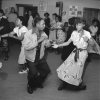Film
Jean Cocteau: Trans-Genre Genius
The 20th Century French poet, filmmaker, artist, playwright, theatre designer and gay gadfly Jean Cocteau was often dismissed as much as celebrated. The protean artist collaborated with many of the key personalities - Diaghilev, Satie, Picasso, Bresson - who shaped music, visual arts, theatre, and the cinema in the early decades of the 20th Century. His small but crucial body of films are featured in this concise survey that begins with a documentary filmed in the artist's final years, as he decorates the interior of a chapel in the South of France. This film series has been selected by Ron Foley Macdonald and is programmed to compliment artist Susan G. Scott's exhibition of paintings, Les Enfants Terribles, and Stephen Schofield's exhibition of sculptural works, at play.
20 October - Jean Cocteau: Autobiography of an Unknown
Edgardo Cozarinsky, France, 1984, 66 minutes.
Using excerpts from his films and archival interviews, Cozarinsky examines Cocteau's wide-ranging life and work in art. Cocteau's precocious history with Diaghilev's Russian Ballet, his importance as literary mentor and his work as a visual artist round out a surprisingly rich portrait of a crucial figure in 20th-Century Modernism.
29 October - Blood of a Poet
Jean Cocteau, France, 1930, 60 minutes
In five episodes, Cocteau examines the relationship between the artist and her or her artwork. Using a dream-like non-linear narrative style full of bizzare effects and startling images, Blood of a Poet charts a different kind of cinematic surrealism that draws on mythic classicism.
3 November - Beauty and the Beast
Jean Cocteau, France, 1946, 95 minutes
Jean Marais and Josette Day star in this dazzlingly beautiful, visually rich tale of transformation and redemption. Definietly not Disney, this film combines a real sense of danger with mythic resonance in haunting, unforgettable sequences.
Thursday, 4 November - From the Surreal to the Fantastic: Jean Cocteau's Influence on the Cinema
In this illustrated lecture, Ron Foley Macdonald engagingly traces the influence of Jean Cocteau's highly original cinematic production on future filmmakers.
10 November - Les Parents Terribles
Jean Cocteau, France, 1948, 98 minutes
A steamy domestic drama about a dysfunctional family. Les Parents Terribles was adapted by Cocteau from his successful stage play. Again starring Josette Day and Jean Marais, the film involves a complex tangle of sexuality, parental rivalry and Freudian obsession.
17 November - Orpheus
Jean Cocteau, France, 1949, 95 minutes
In Orpheus, one of the masterpieces of French Cinema, Cocteau transposes the ancient Greek myth to a weirdly stylized postwar France where messages from the underworld are broadcast on the radio. Inspiring contemporary filmmakers such as David Lynch and Tim Burton, Orpheus again combines poetic surrealism and classicism.
24 November - Les Enfants Terribles
Jean-Pierre Melville, France, 1949, 105 minutes.
Cocteau's novel of rebellious adolescence was brought to the screen by French director Jean-Pierre Melville. A wealthy brother and sister test the boundaries of normal and abormal behaviour, moving from innocence to corrupt obsession.
8 December - The Testament of Orpheus
Jean Cocteau, France, 1959, 80 minutes
Cocteau's final film is a profound meditation on his own role as an artist, writer and filmmaker. Returning to the non-linear style of Blood of a Poet, this film blurs the line between documentary and fiction, featuring Cocteau himself as the main character, with guest appearances by Picasso and Yul Brynner.




